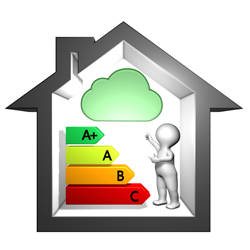Why Should I Have An Indoor Air Quality Test?
Most people are unaware that their indoor air could be polluted. Indeed, today, we spend 90% of our time indoors, relying on our HVAC systems to create a constant stream of healthy air. Our health is dependent on the the quality of the air we breathe. The problem with indoor air pollution is that is not visible to the naked eye, meaning the quality of your air could be making you sick without you even knowing it. Despite your efforts to maintain a clean and healthy household, you still may be getting sick because of indoor pollutants.
Symptoms of Poor Indoor Air Quality
Our bodies are designed to rid ourselves of toxins and pollutants, this is one of the reasons that we get sick and experience colds and flus. However, if you or other’s in your family seem to always be sick, the air you are breathing could be the cause.
Do you often experience the following health issues?
- Headaches;
- Respiratory issues such as asthma, sinusitis, and other respiratory infections such as bronchitis and pneumonia;
- Excessive coughing and/or a breathless feeling;
- Dizziness, confusion, malaise, trouble concentrating, and other cognitive disorders;
- Skin irritation, itchiness, and rashes;
- Ear and/or eye infections
If you consistently experience these symptoms, the air you are breathing could be the cause.
A simple test is to record how you feel when you are away from your home or business. If you feel sick when you are in your home or business, but feel much better when you are away, then this could be a clue that the air is making you sick.
What Causes Poor Indoor Air Quality?
Contaminated air can seep in from the outside or could be caused by indoor sources like construction materials, consumer products, mold, insects, and pets. The effect of pollutants is compounded by poor ventilation which allows pollutants to accumulate to unhealthy levels.
Poor indoor air quality in your home or business could also be caused by factors such as the building design, heating/cooling design, and/or previous water damage.
Other potential causes of poor indoor air quality include the following:
- High humidity levels.
- Airborne dust problems from poorly maintained ducts or other sources in the building.
- Volatile Organic Compounds (VOC’s) which are chemicals released by building materials and furniture.
- Inadequate ventilation caused by mechanical or building issues.
- Combustion problems leading to high levels of Carbon Monoxide (CO) or Carbon Dioxide (CO2).
- Sewer gas leakages, leading to odors.
- Recurring water damage, causing growth of mold and other bacteria.
- Radon, the second highest cause of lung cancer, most likely seeping through the foundation in your basement.
- Radioactive marble or granite in the home.
- Air borne asbestos, a cause of mesothelioma.
What Should I Do?
The easiest way to determine if the air you are breathing is making you sick is to call an indoor air quality specialist to test the air. Indoor air quality professionals have specialized equipment that can test the air for radon, mold spores, and other pollutants.
At Mold B Gone, our Indoor Air Quality testing uses OSHA, NIOSH, and EPA testing procedures to investigate indoor air quality complaints. We can test for 100s of compounds, including gases, chemicals, dust, and biological samples to give you a profile of your air.
One of the services we specialize in is mold testing, which is done by taking air samples from both inside and outside the building so the spore numbers can be compared with each other. If the testing shows high mold spore counts, then a mold inspection and mold removal plan will be provided to you.
In order to ensure the most accurate and reliable results, Mold B Gone utilizes specialized calibration instruments and sample handling procedures. In addition, controlled samples are compared with yours to ensure the most accurate results possible. We use Third Party Labs to analyze the results of all of the samples we take to provide you with a detailed air quality report and recommendations.
If you are concerned that you may have indoor air quality issues and have questions, call 678-697-6267 or send us an e-mail.
What Is Indoor Air Quality Testing? If you or someone in your family suffers more frequently from colds or flus and you are not sure why, the cause could be poor indoor air quality. Learn more!
Posted by Mold-B-Gone Remediation, LLC on Friday, August 28, 2015
What Is #IAQ Testing? Suffer from colds frequently? Poor indoor air may be the cause. RT PLS http://t.co/HlySR27TxQ pic.twitter.com/kNxRu1dAA0
— Mold B Gone (@moldbgonega) August 28, 2015


